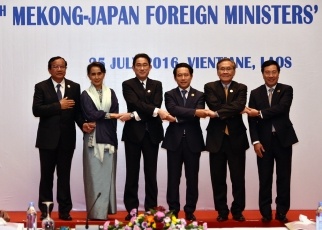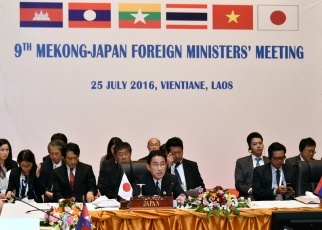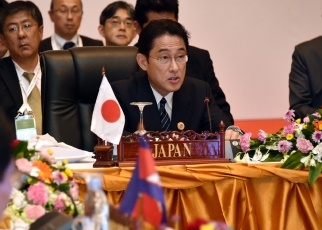Asia
The Ninth Mekong-Japan Foreign Ministers’ Meeting
July 25, 2016



On Monday, July 25, commencing at around 6:40 p.m. (local time) for approximately 40 minutes, Mr. Fumio Kishida, Minister for Foreign Affairs of Japan, attended the Ninth Mekong-Japan Foreign Ministers' Meeting held in Vientiane, Laos, serving as co-chair with Laos. The overview of the meeting is as follows (The attendees from the Mekong region countries consisted of H.E. Mr. Saleumxay Kommasith, Minister of Foreign Affairs of the Lao People's Democratic Republic, (co-chair); H.E. Mr. Prak Sokhonn, Senior Minister, Minister of Foreign Affairs and International Cooperation of the Kingdom of Cambodia; H.E. Daw. Aung San Suu Kyi, State Counsellor and Union Minister for Foreign Affairs of the Republic of the Union of Myanmar; H.E. Mr. Don Pramudwinai, Minister of Foreign Affairs of the Kingdom of Thailand; and H.E. Mr. Pham Binh Minh, Deputy Prime Minister and Minister of Foreign Affairs of the Socialist Republic of Viet Nam). A Co-Chair's Statement (PDF) was issued following the conclusion of the meeting and the launch of the "Japan-Mekong Connectivity Initiative (PDF)
was issued following the conclusion of the meeting and the launch of the "Japan-Mekong Connectivity Initiative (PDF) " was announced.
" was announced.
 was issued following the conclusion of the meeting and the launch of the "Japan-Mekong Connectivity Initiative (PDF)
was issued following the conclusion of the meeting and the launch of the "Japan-Mekong Connectivity Initiative (PDF) " was announced.
" was announced.1 Opening Remarks
(1) Minister Saleumxay expressed his pleasure at having the opportunity to serve as co-chair of the Ninth Mekong-Japan Foreign Ministers' Meeting with Minister Kishida and welcomed progress in Japan-Mekong cooperation. Minister Saleumxay also voiced gratitude for Japan's initiatives, including the Japan-Mekong Connectivity Initiative proposed by Minister Kishida in Thailand in May 2016.
(2) Minister Kishida expressed his gratitude for the extensive efforts made by Laos, the co-chair, and stated that steady progress is being made in the implementation of the Mekong-Japan Action Plan, following last year's adoption of the New Tokyo Strategy 2015, expressing Japan's commitment to providing official development assistance of 750 billion yen in three years to the Mekong region. Furthermore, Minister Kishida explained that Japan hopes to work together toward the realization of quality growth in the Mekong region and to officially launch the Japan-Mekong Connectivity Initiative, which was proposed in Bangkok in May, with the Mekong countries.
(2) Minister Kishida expressed his gratitude for the extensive efforts made by Laos, the co-chair, and stated that steady progress is being made in the implementation of the Mekong-Japan Action Plan, following last year's adoption of the New Tokyo Strategy 2015, expressing Japan's commitment to providing official development assistance of 750 billion yen in three years to the Mekong region. Furthermore, Minister Kishida explained that Japan hopes to work together toward the realization of quality growth in the Mekong region and to officially launch the Japan-Mekong Connectivity Initiative, which was proposed in Bangkok in May, with the Mekong countries.
2 Japan-Mekong Cooperation
(1) Minister Kishida made the following remarks on progress in Japan-Mekong cooperation.
- Regarding progress in Japan-Mekong cooperation since last year's Foreign Ministers' Meeting, Japan's "hard" efforts in particular, have accelerated over the past year, and these efforts are being implemented based on the concept of quality infrastructure investments. At the G7 Ise-Shima Summit, the G7 nations issued the G7 Ise-Shima Principles for Promoting Quality Infrastructure Investment and committed to the provision of approximately $200 billion in funds over the next five years. Japan intends to continue to contribute to physical connectivity in the ASEAN region.
- Steady results are being achieved with regard to "soft" efforts as well. The Industrial Human Resource Development Cooperation Initiative announced last year, which aims to train 40,000 people over three years, has already implemented training for 15,000 people in ASEAN countries. The Vietnam-Japan University plans to begin a master's course in September, and Japan announced the provision of additional assistance for the Rule of Law Center in Myanmar. Japan is also strengthening efforts to improve people-to-people connectivity. Furthermore, Japan hopes that the entry into force of the Japan-Laos Air Services Agreement and the Japan-Cambodia Air Services Agreement this year will increase the exchange of people even further.
- Japan intends to actively contribute to the realization of a Green Mekong. Japan and Thailand co-hosted the 4th Green Mekong Forum in June. This was a meaningful event in which knowledge was shared and opinions were exchanged across sectors.
- The number of Japanese companies entering the Mekong region is rapidly increasing, and Japan is accelerating its contributions to the Mekong region at both the public and private levels. The New Tokyo Strategy 2015 has made a smooth start.
- I proposed the launch of the Japan-Mekong Connectivity Initiative aimed at the realization of "vibrant connectivity" in my policy speech in May. Japan hopes to launch senior-level working groups to flesh out this initiative and to engage in detailed discussions with Mekong countries.
- Progress in Japan-Mekong relations in a variety of areas, such as infrastructure, human resource development, and investment promotion is greatly appreciated. Japan-Mekong cooperation is accelerating. The Mekong countries are actively participating in various projects under the Mekong-Japan Action Plan. The Mekong countries also appreciate the steady assistance provided by the Japanese Government. Additionally, investments from Japan and activities by Japanese companies are expanding. Advances in quality infrastructure investment will also contribute to green growth in the region.
- The launch of the Japan-Mekong Connectivity Initiative is sincerely appreciated. This initiative supports autonomous efforts by Mekong countries and complements the 2030 Agenda for Sustainable Development. Formation of senior-level working groups is an important mechanism for following up on the Mekong-Japan Action Plan. We are on the right track.
- It is important to address climate change and to actively deal with natural disasters such as flooding and droughts, and water resource management. The Green Mekong Forum plays an important role. Balancing economic growth and environmental protection is vital in all types of projects.
- People-to-people connectivity is essential as well. Easing visa requirements has had a major impact on the expansion of tourism. The start of a direct flight between Phnom Penh and Narita in September is a welcome development.
3 Regional and International Situations
The participants also discussed the issues in the South China Sea, issues related to North Korea, and other regional and international situations.

